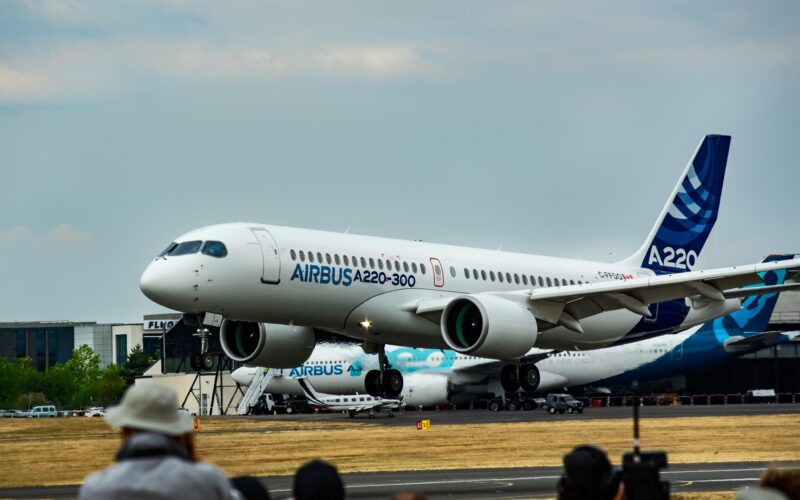Transport Canada (TC) has issued a new airworthiness directive (AD) stating that a “manufacturing quality escape” made by a supplier could affect the overheat detection sensing elements within the bleed air system on the Airbus A220.
TC said that the overheat detection sensing elements “were manufactured with insufficient salt fill”. Since they are used by the bleed air leak detection system to measure the temperature in the event of a hot bleed air leak, the lack of salt fil on the elements could result in a detection failure. As a result, the regulator stated that this could damage “surrounding structures and systems that can prevent continued safe flight and landing”.
Airbus Canada Limited Partnership (ACLP), the company responsible for the A220 program, which is based in Mirabel, Quebec, previously issued two Service Bulletins (SB), “to test all affected bleed leak detection system sensing elements, and to replace any sensing element that may have insufficient salt fill”.
Airbus owns 75% of ACLP, while the Quebec government owns the remaining 25%.
In response to the SBs, Transport Canada issued an AD in March 2022 addressing the unsafe condition.
The regulator issued the latest AD, which will come into effect on May 2, 2023, after determining that there was “was an error in the affected part definition with respect to identifying parts that had been determined to be serviceable parts in accordance with” an SB issued by the part manufacturer, Kiddie Aerospace and Defense.
The latest AD by TC supersedes the directive from March 2022 and “corrects the error by aligning the affected part definition”.
Affecting A220-100 and A220-300 aircraft
The latest directive from TC will potentially affect more than 172 Airbus A220-100 and A220-300 aircraft, split into Group A and Group B.
The Canadian authority identified the affected part as a sensing element with a part number defined in Kiddie Aerospace and Defense SB CFD-26-1, unless that part has been tested according to the manufacturer’s SB accomplishment instructions and was found serviceable or has been “marked on one face of its connector hex nut in accordance” with the same instructions.
Alternatively, those sensing elements that are not affected by the AD were previously tested and found to be serviceable according to the superseded AD or were “colored with two green or two black witness marks on one face of its socket type connector and pin type connector hex nuts” according to instructions of ACLP SB BD500-362002.
To comply with the AD, operators of Group B aircraft whose manufacturing date is on or before April 11, 2022, must “verify the aeroplane maintenance records to confirm if any affected part has been installed since the aeroplane date of manufacture”. If the affected part is installed, or the airline is unable to confirm the installation of the sensing elements, the same instructions apply as for Group A aircraft.
In terms of Group A aircraft, the directive asks airlines to test the sensing elements within 2,450 flight hours (FH) or 18 months from April 18, 2022, whichever occurs later. If the affected parts fail the tests, they must be replaced and marked before further flight according to ACLP SB BD500-362002.
Alternatively, the elements have to be tested within 9,450 FHs or 18 months from April 18, 2022, whichever occurs later, and replaced if the part fails the test. This must be done in accordance with ACLP SB BD500-362003.
TC prohibits installing any sensing elements that were tested, unless the part is serviceable.
The latest Group A Airbus A220-100 manufacturer serial number (MSN) mentioned in the AD issued by TC us 50061, an A220-100, which, according to ch-aviation.com data, is registered as N141DU and was delivered to Delta Air Lines in March 20021. The latest Group A A220-300 MSN is 55109, an aircraft belonging to Air Canada and registered as C-GTZH.
In terms of affected aircraft in Group B, the latest A220-100 MSN is 50062, Comlux Aviation Malta’s Airbus Corporate Jets (ACJ) delivered in January 2022, registered as 9H-FIVE, while the latest A220-300 MSN is 55110. The aircraft was delivered to Swiss International Air Lines (SWISS) by Airbus in May 2021, and is registered as HB-JCU.
However, the AD will apply to subsequent MSNs of Group B aircraft, including the A220-100 and A220-300.
The bleed air system takes excess air from the aircraft’s engines and provides it to systems including but not exclusive to the wing anti-ice system, cabin pressurization, and pressurization of water, waste, and hydraulic tanks.

